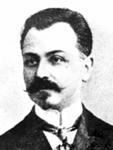Khoyski Fatali Khan Isgender
Khoyski Fatali Khan Isgender

(1875 -1919)
Tenures of Office
(26.12.1918 - 14.03.1919), (24.12.1919 - 01.04.1920)
One of the prominent state and political figures of Azerbaijan, as well as the founders of the independent Azerbaijan and its first Prime Minister Fatali Khan Khoyski was born on November 25, 1875 in Shaki.
After graduating from the classical gymnasium of Elisabethpol (Ganja) in 1892, F.Khoyski entered the Faculty of Law of the Moscow University and graduated summa cum laude from the said university in 1897. He worked in various positions in the Elisabethpol, Kutaisi, Yekaterinodar county courts in 1897-1907. His appointment as an Assistant Prosecutor of Yekaterinodar County Court opened a new phase in Khoyski’s socio-political activities.
He was elected a deputy to the Second State Duma from the province of Elisabethpol. Speaking at the meetings of the State Duma, F.Khoyski criticized the colonial policy pursued by the Tsarist government in the Transcaucasia and Azerbaijan. Despite formally being a member of the Kadet Party, he was in the Muslim Faction of the Duma. F. Khoyski demanded from the government to grant local autonomy to the peoples under the Russian colonization.
After the dismissal of the Second State Duma, F.Khoyski came to Elazabethpol and started to work as a juror in 1907-1912.
From 1913 to 1917, F. Khoyski worked as a juror in the Baku County Court.
After the February Revolution and the October Coup of 1917, a new phase began in the activities of F.Khoyski. He was intensively involved in the political and social struggle and soon became one of the leaders of the movement for the freedom and independence of the Azerbaijani people. F.Khoyski was elected a member of the Interim Executive Committee of the National Muslim Council established on March 29 in Baku. He attended the Congress of Caucasian Muslims convened in April 1917, in Baku as a result of great efforts of this organization.
He was a member of the Transcaucasian Seim established in December 1917, and the Minister of Justice of the government of the independent Transcaucasian Federative Republic proclaimed its independence in April 1918.
On May 26, 1918, at the last meeting of the Transcaucasian Seim, a decision on dismissal of the Seim and declaration of independence of Georgia was adopted. As such, on May 27, the extraordinary meeting of the Muslim faction was held, and the Interim National Council under the chairmanship of M.Rasulzade and the Executive Committee of the National Council under the chairmanship of F.Khoyski were established.
An act declaring independence of Azerbaijan was adopted at the meeting of the Interim National Council held on May 28, 1918. F.Khoyski was one of 24 people who signed the Declaration of Independence. At that meeting, the National Council commissioned F.Khoyki to form a government of the Azerbaijan Democratic Republic. After an hour break, F.Khoyski presented the government's composition to the National Council. In this government, F.Khoyski was appointed as the first Prime Minister and Minister of Internal Affairs of the Council of Ministers of the Azerbaijan Democratic Republic.
On June 17, 1918, with the instruction of the National Council of Azerbaijan, a second Cabinet was established under the chairmanship of Fatali Khan Khoyski. F.Khoyski also served as Prime Minister and Minister of Justice in the second government.
F.Khoyski served as Prime Minister and Minister of Foreign Affairs in the III Government Cabinet organized in December 26, 1918.
It was indeed during his time that the foundations of state bodies of Azerbaijan were laid. During his term in office, he succeeded in removing the city name Elisabethpol and restoring the historic name of Ganja, renaming the Karyagin county to Jabrayil county, establishing a multi-party system, issuing Azerbaijani postage stamps and Azerbaijani currency, founding schools and seminaries with education in Azerbaijani.
In March 1919, the government led by Fatali Khan Khoyski resigned.
Fatali Khan Khoyski served as the Minister of Foreign Affairs in the 5th Cabinet led by the Chairman of the Council of Ministers N.Yusifbayli. F.Khoyski played a key role in the recognition of the Democratic Republic of Azerbaijan in the international arena by foreign countries.
On June 19, 1920, in Tiflis he was shot in the back by a hired killer and was buried next to M.Akhundov.
